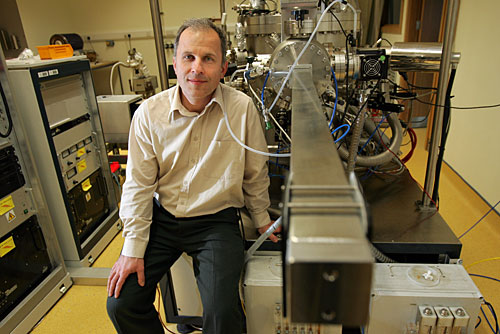TCD Professor in Applied Physics Gives Inaugural Lecture on ‘Intelligent Energy Options for the Future’
Posted on: 03 December 2008
On the occasion of Professor Igor Shvets’ inaugural lecture entitled ‘Intelligent Energy Options for the Future’ as Chair in Applied Physics at the School of Physics which took place this week, Professor Shvets outlined the opportunities that could be pursued by scientists and engineers in order to reduce consumption of fossil fuels. This includes developing new technologies and material that can lead to greater efficiency in the energy extraction from the fossil fuels and development of sources of energy that are not based on fossil fuels at all. Professor Shvets discussed in particular challenges to wide-scale utilisation of the solar energy.
In the course of the lecture he questioned how “green” the current electric power generating technologies were and what role scientists and engineers could play in reducing carbon dioxide emissions from mainstream power production facilities.
On transport related issues and in particular the world’s fascination with the petrol car, Professor Shvets discussed what could be done to move to a more sustainable situation and how technology could improve the emissions for petrol cars. He discussed the electric car and in particular the main problems with electric cars and what improvements and innovations were required to make the electric car commonplace.
He discussed the hydrogen car in terms of its competitiveness and elucidated the key technological roadblocks associated with the hydrogen car.

Prof Igor Shvets at a Molecular Beam Epitaxy (MBE) Thin Film Deposition System located in on of TCD’s research laboratories in CRANN.
In relation to solar power, he argued that solar power is the ultimate green energy and that Ireland should not be afraid to engage in solar energy research due to her northerly latitude. According to Professor Shvets: “At the end of the day it is global market and the technology pioneers will win large economic rewards. After all, the world’s solar energy research capital is in Hamburg which does not get much more sun power than Ireland.” Professor Shvets will outline what is required to make solar power a competitive source of energy for the earth.
In concluding the lecture, Professor Shvets unveiled his ‘Specific Irish Solution to an Irish Energy Problem’. Commenting on its significance, Professor Shvets says: “This is an innovative energy solution that that takes into account her unique landscape and geographic location. It could help Ireland drastically reduce not only its carbon dioxide emissions but also its reliance on imported fuel sources.”
Notes to the Editor
About Professor Shvets
Professor Igor Shvets holds a Personal Chair in Applied Physics, created in 2007 in recognition of his scientific and professional contribution to his discipline and to Trinity College Dublin. He is also the recipient of two consecutive Science Foundation Ireland Principal Investigator Awards. Professor Shvets leads one of the country’s most active research groups routinely publishing 12 – 15 papers annually in international peer reviewed journals. His main research interests are the in fields of advanced materials and nanoscience. Professor Shvets is also a serial inventor and entrepreneur, having successfully spun out two campus companies as a result of his research. He was awarded the Trinity College Dublin Entrepreneur of the Year in 2005. Professor Shvets is the inventor on over 50 patent and patent applications in Europe and the US.
